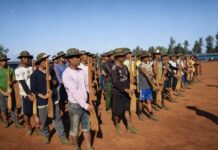Tuesday, 20 October 2015
Blessed are the peacemakers, for they shall take flak from both sides.
(Unofficial UN motto, Robert Asporin)
Today, I attend 3 meetings:
- U Tin Aye, Chairman, Union Election Commission
- EAOs workshop on Military Code of Conduct (CoC), liaison offices (L.O.s) and Terms of Reference (TOR) draft for JMCs
For the first one, it has already been reported in the media and I have nothing more to add, except that the purpose of the meeting is to ask him not to cancel any constituencies within the EAOs control without consulting them first.
Most of the work on the CoC and L.O.s, thanks to the rebels’ Nationwide Ceasefire Coordination Team (NCCT) and Union Peacemaking Working Committee (UPWC), has already been done. The rest are additions made under the guidance of the KNU’s Ta Do Moo, who has become an authority on the subject.
What I would like to report here is the meeting with visiting experts on comparative peace processes:
- -Gen. Rodolfo Garcia, on ceasefire negotiations with Moro Islamic Liberation Front (MILF) in the Philippines
- Sanjoy Hazarika, an Assamese Tai, on the Naga peace process
- Karin Landgren, on the peace processes in Liberia and Burundi
The venue is (late UN Secretary General) U Thant’s House, hosted by his grandson Dr. Thant Myint U and his energetic wife, Sofia Busch.
I’m a slow learner and pick up only a little from each of these lectures. And these are the things I have learned from them:
- Sanjoy: The Nagas signed a ceasefire with New Delhi in 1996, but 19 years after, no political agreement has been reached
- Karin: There are unlimited funds for the peace process in Burundi, so no one wants to end it
- Garcia: The MILF peace agreement was signed in March 2014. But more than a year later, it is yet to be approved by the Congress
The last one affects me, if no one else. The question that comes spontaneously is, of course, what if the present parliament (which is yet to be dissolved) does not also approve the NCA? The answer is clear, of course: Hardliners on both sides will win and all of us, except the people, will happily return to war.
We later learn that the parliament is scheduled to meet on November 16, eight days after the elections.
After the presentations wind up at 18:00, I return to the hotel with a newly retired general. Naturally we discuss politics and the upcoming polls. He tells me: like it or not, the military is the power in the country and The Lady will be well advised to come to terms with it.
I pack up my things before going to bed. As usual I have a lot of reading material to carry and the airline won’t be happy letting it go without charging me.
But so far I’ve gotten by. I’ll manage, so I say to myself before turning in.
The next day, the taxi driver skillfully navigates me through Rangoon’s notorious traffic and unloads me at the airport within an hour after leaving the hotel.
At the airport, I meet people from a peace funding agency, who tell us (on the following day) that there will be no special favors given either to the signers or the non-signers.
Well, I think that’s fine with me, as long as the help comes.
I have a cup of wine with my lunch on the plane and take a nap. When I open up my eyes again, we are already landing.
By Sai Khuensai / Director of Pyidaungsu Institute and Founder of Shan Herald Agency for News (S.H.A.N)












Leave a Comments